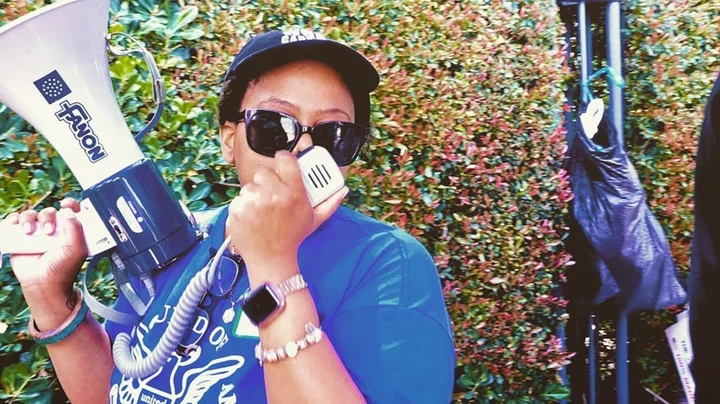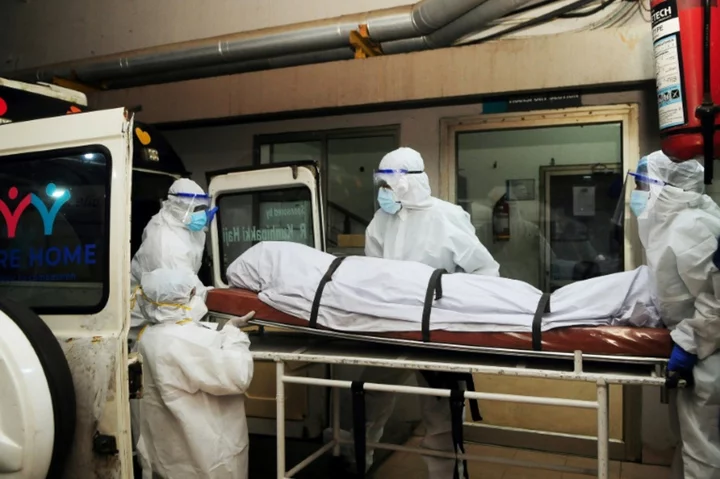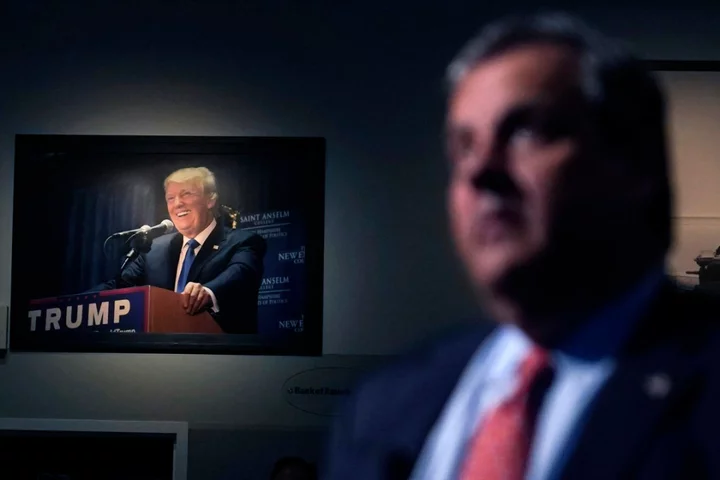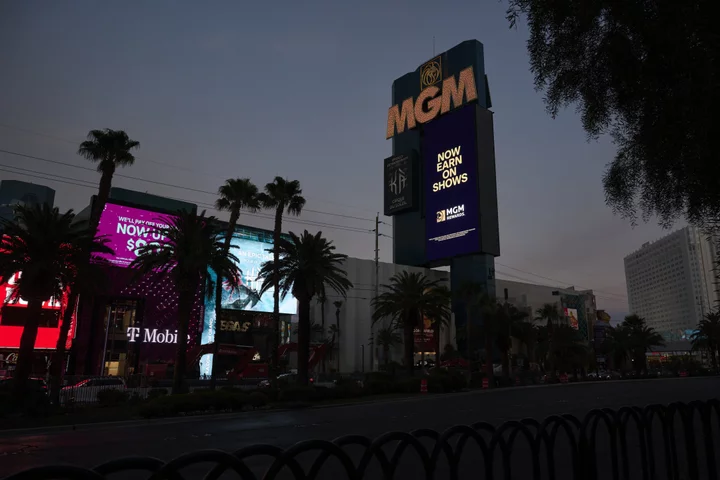In the summer of 2022, a year before the WGA writers strike, a friend of mine attended a wedding and met a Hollywood TV producer. At the time, I was employing this friend as a part-time assistant, and she was excited to tell this producer — a white man, it must be said — about the work we were doing together. That year I had been in two writers rooms while simultaneously revising a feature, a pilot, and shopping two separate shows around town. “It’s a white woman getting all that work?” the producer asked her, incredulous. My friend corrected him: “No, she’s Black.” That seemed to clear something up for the guy. “Oh, that makes sense,” he told her. “They’re the only ones getting work these days.”
I had hired my friend because I was fighting to survive one of the hardest years of my life. I was overloaded, burnt to a crisp, and fighting suicidal ideation every day. By answering emails and setting meetings, my friend was helping keep my head just barely above water. All that man had been interested in, though, was the idea — one that’s been proven false over and over again — that people like me were stealing his jobs.
Now, with the WGA writers strike raging, I spend my days picketing beside this man (or white producers just like him). It’s highlighted something for me: Writers are scared most of the time, regardless of their racial background, because our industry has crumbled over the last twenty years. That doesn’t excuse his thinking, but it does clarify it. It also highlights the strange intersection at which Black women in Hollywood often find themselves: Fighting for the masses, while many within those masses bear grudges or unconscious biases against us.
Every screenwriter I know is in ardent support of this strike. The WGA’s demands are varied, but they come down to a simple ask: Writing movies and TV used to be a career, and in the years since streamers took over has been whittled down to a dangerously unstable gig economy. Residuals have been stripped down to practically nothing, even for those writing on TV’s biggest hit shows. It’s not a system that’s sustainable for most writers, who, contrary to what some believe, are by and large not even close to wealthy. The WGA is asking for a “fraction of a percent” of the revenue of each big studio. These companies make billions, and pay their top execs hundreds of millions — and the AMPTP is reportedly costing the California economy $30 million for every day they refuse to hear reason.
We are artists, and we want to ensure that our art gets the chance to exist… We are fighting for our continued existence in an industry that can’t seem to decide if they really want us here at all.
alanna bennettIn a way, picket lines are a great unifier. But they don’t erase the complicated dynamics that screenwriters on the margins have always faced.
I do not know that producer’s name or his face, but I am searingly aware that he, too, is likely spending his summer wielding a sign outside the studios, fighting for the very basics. But he’s not really fighting for me, is he? He’s afraid of me, and I am afraid of him — because on top of all the other fears and insecurities I carry in this industry, I am also faced with the ones inherent to being a Black woman trying to survive.
DashDividers_1_500x100Caroline Renard, a writer for Secrets of Sulphur Springs and a WGA strike captain, was an assistant in high-powered studio exec offices for years. She overheard many similar sentiments to the one expressed by that producer. “Being an assistant for so long, people tend to forget you’re in the room,” Renard says. “They say their truths in front of you.” What she noticed was that Black women writers were openly discussed as less talented. “They don’t think we have the chops,” she says, “but they never question [other writers] who don’t have a third of your resume.”
It was never going to be fair. I knew that. Renard knew that. Black women make 63 cents for every dollar a white man makes. Being a Black woman in any western workplace means growing accustomed to coworkers mistaking you for the other Black girl in the office, no matter how different you may look from each other. It means learning to phrase things just right, your voice lilted upward and serene, because if you dare go deadpan you will likely be seen as angry, or aggressive, or overly sensitive.
Shortly after George Floyd’s murder, I watched a white woman weep in a writers room for a scripted TV show I was working on, as she realized for the first time that Black family members of hers might experience racist violence, too. I felt for her. Crying was natural. I was also aware that I didn’t have the freedom to show my emotions in this same way, not in public, no matter how crushed I was under the weight of the same events. My career and reputation might be in jeopardy if I did. I’d experienced this already.
The year before, in the same room, my whole body had shaken as I got up the nerve to gently suggest we not pursue a story I knew would be racist. I’d spent six years reporting on representation in Hollywood, and 29 years living as a Black woman. Years of tangible research and training told me I was right, but I was still terrified of offending anyone by bringing it up. I spoke my piece, then cried in the safety of a bathroom stall, wiping all evidence away before returning to the office. Still, after that season wrapped, a coworker informed me that two white women in the room — one of whom was the one who’d cried over the idea of racism — had deemed me “too negative.” They told my coworker to watch out for me. As this coworker had put it, “I truly could not believe this dog whistle.”
I carry with me certain undeniable privileges: Though I am a queer Black woman, I am also cis, mixed race, and lighter than a paper bag. Colorism is alive and real, and I have no way of knowing who chooses to hire me because I am in some way a more “palatable” way to hit their diversity quota. Still, when I speak of my experiences to other Black women in the industry, their eyes light up with recognition.
A lot worse could have happened to me, and does to plenty of people. In Mo Ryan’s Vanity Fair exposé about the writers room of Lost, writer Monica Owuso-Breen, a Black woman, recalled a trip where, “in answer to a question about the luggage, one writer—using a Yiddish word—said, ‘Let the schvartze take it.’” In Yiddish, schvartze is a slur against Black people. Hollywood is filled with stories like this, with micro- and macro-aggressions against virtually everyone who falls under the category the industry likes to call “diverse.”
But being a Black woman in Hollywood also comes, it must be said, with an unimpeachable joy. We get to create worlds, help shift culture, and craft characters who look like us, the kind we would have killed to grow up watching on TV or in movies. “I love being a Black woman screenwriter,” Woke and Queens writer Kyra Jones told me. She recalled how “magical and healing” it felt as a kid to see people like herself on screen. “I love that I’m in the position to provide that experience to other Black women and queer folks.”
It’s why the Black women screenwriters I know begrudgingly bear the rest: We are artists, and we want to ensure that our art gets the chance to exist. That we get the chance to keep creating it. With the writer’s strike, that’s more complicated than ever. We are fighting for our continued existence in an industry that can’t seem to decide if they really want us here at all.
As is often the case, survival — of our careers, but also of our brains and hearts — is made possible by finding community in each other. Renard joined forces with Hacks and Yellowjackets writer Katherine Kearns to co-found a group called Black Women Rising, a collective of Black women and non-binary screenwriters who meet once a month to discuss their experiences. I first joined this group on a summer day in 2021, when I wound my way through a Culver City park to find dozens of Black women sharing sunscreen and snacks. We laughed, and shared congratulations about recent promotions and big breaks into the industry. We celebrated each others’ joy, and we talked about our very big dreams.
A few months later, at another meeting, we gathered for brunch in a member’s apartment, and people cried while relaying frustrations about having been shoved aside, disrespected, and seen as less-than than their white counterparts. They lamented being made to repeat staff writer (the lowest-level rung in a writers room) because showrunners were less likely to see them as “ready” to advance. Multiple people echoed stories like the one I’d experienced, where they were hired as a “diverse” voice who could help their bosses avoid being seen as racist, only to find that when they actually spoke up they were written off as overly-sensitive.
“Sometimes I feel like my voice and experiences as a Black woman are sought after and respected in this business,” Jones said over email. “Other times I feel like people avoid hiring me because I am so unapologetic in my Black womanhood.” Jones also recalled a job interview she’d had for a spot in a writers room, and how the showrunner (a white woman) had called around to several peers and former bosses. One of the references informed Jones that the showrunner had expressed worry that Jones “was going to get her canceled.” Jones interpreted this as the woman wanting “to be able to say whatever racist, sexist, or other flavor of bigoted thing she wanted to say without repercussion, and she could tell I likely was going to hold her accountable.”
Sometimes I feel like my voice and experiences as a Black woman are sought after and respected in this business. Other times I feel like people avoid hiring me because I am so unapologetic in my Black womanhood.
kyra jonesHollywood is a notoriously tough industry, and none of the Black women I know expect special treatment within it. Still, we know how to spot the undertones when they’re there. The overtones speak for themselves: According to the WGA’s 2022 Inclusion & Equity report, there’s been progress in how many BIPOC women are hired as staff writers in TV writers rooms (36.6% in 2020). But those numbers fall off a steep cliff, hitting only 6.9% and 7.4% when you get to the levels of showrunners and executive producers. These are, not coincidentally, the only positions in a writers room imbued with actual decision-making power. Meanwhile, in features — where execs and directors have far more say than writers anyway — BIPOC women make up only 9.6% of all movie writers, which is still a victory; the number went up 2.4% between 2019 and 2020.
Black women are not a monolith, and neither are Black women screenwriters. Our experiences vary. Still, there are common throughlines in the narrative, and these follow us into every space we occupy — including massive labor union meetings where we must put our reactions to these experiences on the backburner to fight the fight that’s in front of us. If Black women are to stand any chance at a future in Hollywood, the WGA needs to win this fight. Right now, none of us are writing movies or TV. The peers who’ve walked this path with me were already underpaid, underemployed, and underestimated, and now we’re all out of work. The stakes were already so high — and now they’re higher than ever. “If we don’t get new contracts that pay us our worth,” Renard says, “there will be a mass exodus of Black Women from Hollywood.”
There’s a reason so many writers have called this strike an “existential” crisis. The very idea of what a screenwriter is is in jeopardy, from our ability to pay rent, to our right not to be replaced by AI. Wouldn’t it just suck so badly if computers stole our jobs before Black women got to experience equity in the workplace, or the respect we deserve from our peers?
DashDividers_1_500x100Lauren Glover was a nursing student in Maryland when she fell in love with TV writing. She finished her degree, and in a recession with no job in sight she moved to Los Angeles, where she became a member of Black Women Rising and worked as an assistant before joining the writers rooms for Damascus and Nancy Drew. She counts herself as one of the lucky ones, having been staffed in multiple writers rooms in a row, and feeling heard and respected in both of them.
“Striking right now is overwhelming, exciting, frustrating, and enraging all at the same time,” Glover told me over email. “It’s extremely anxiety-inducing to not know how long I’m going to be able to pay my bills because there’s no expected end date for the strike.”
Black women may know better than anyone what they’re fighting for with this strike. “Our careers are at stake,” Glover told me. And aren’t they always? The AMPTP has just upped the ante, made textual the subtext we always have to wade through anyway — whether we’ll get paid what we deserve, or be allowed to advance, or have the resources to last in this industry long-term, even with a thousand forces constantly trying to push us to the side.
If we don’t get new contracts that pay us our worth, there will be a mass exodus of Black Women from Hollywood.
caroline renardRenard recalls that there have been “lots of days where I would question if this was worth it,” or that made her wonder if she’d have been better off in a profession “that didn’t require so much emotional labor.” It’s the community that she’s found with other Black women writers that she says “keeps me believing that one day we can actually make this industry equitable. Black women will be allowed to tell our stories.”
I breathed easier when I joined Black Women Rising. I found real friendship and valuable support. Billie Jean King’s quote that “you have to see it to be it” is a popular refrain often trotted out to prove the power of representation. But it doesn’t just apply to characters we see onscreen, on tennis courts, or in political office. In our lives, every day, we have to see each other to know we’re not alone. That there are others facing similar challenges — and perhaps even more importantly, there are people like you surviving and thriving in spite of them. People who see you, who help you nurse your wounds and celebrate your wins.
Every writer I know is scared. Even before the strike, I’d talked to several Black women on the verge of getting pushed out of the industry because they couldn’t pay their bills. One told me she couldn’t afford to get her family Christmas presents. So many of us have been drowning for a long time now, and for so many reasons. “Being a screenwriter is completely unsustainable right now, especially for Black women and other underrepresented writers,” Jones says. “It’s only going to get worse if we don’t fight back.”
For the Black women I know, the picket lines are just proving what we already knew. They’re visual reminders of how white and male our industry is, of how far there is left to go. Still, there’s a silver lining: We get to find more of each other. We are gathering in unprecedented numbers, sharing stories and planning our paths forward.
Black women help each other breathe. We are each other’s air.
I hope that white dude producer who was so sure I was stealing jobs gets what he needs to survive in this industry. I hope I do, too. But for the writers who’ve long been marginalized, the fight doesn’t end with a fair contract.
I have not yet knowingly run into that producer. A few weeks ago, though, I was walking the Disney picket line when an older white man in a WGA shirt came up to me. “I really thought you were Maya Rudolph!” he said, so cheerful about his own mistake. I waved it off politely, bemused because I am 20 years younger than Rudolph with very different features. This man had seen a beige-skinned Black lady and thought, “Hey, Maya!”
Lucky for me, Renard is at the WGA tent at Disney most days. It’s the same place she used to work at as an assistant. She wields a megaphone and oversees a different kind of community than she does with Black Woman Rising: she organizes the picket line. I told her what had just happened, and she rolled her eyes with a knowing smirk. We laughed. And we laughed. And we laughed. And then we plotted our Hollywood takeover.









